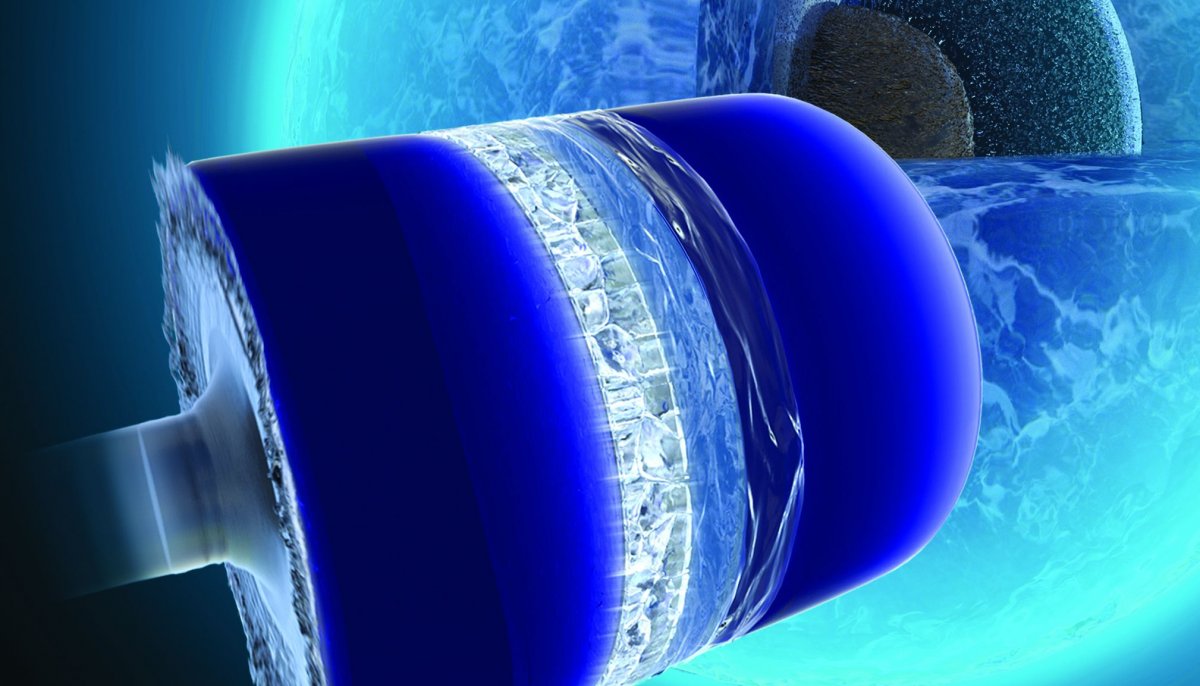Researchers have unraveled a long-standing mystery relating to a bizarre form of ice which grows at over 1,000 miles per hour and is thought to exist deep within hypothetical "ocean world" planets far beyond the Solar System.
In a paper published in the journal Physical Review Letters, a team from the Lawrence Livermore National Laboratory (LLNL) have revealed the secrets of how this strange phase of ice, known as "ice VII" or "ice seven" freezes and crystallizes, Physics Central reported.
Water can take a number of different forms when it solidifies, of which ice VII is one. For example, at normal pressures, water molecules form hexagonal crystal structures, creating "ice Ih", or ordinary ice. Virtually all of the ice that humans encounter on Earth takes this form.
However, under conditions of extreme pressure, water molecules can arrange themselves into different shapes. Ice VII, for example, only forms from liquid water at pressures at least 30,000 times greater than what we are used to on the Earth's surface.
Despite this, scientists have been able to create ice VII in laboratory experiments that use shock waves to compress liquid water to pressures 100,000 greater than normal conditions.
The bizarre form of ice has also recently been discovered deep within the Earth's mantle trapped inside diamonds. Researchers have long known that ice VII exists naturally far below our planet's surface, but until this finding, there was no direct evidence for it.
For the latest study, the researchers wanted to understand more about exactly how ice VII forms—a process which has long puzzled researchers. Previous experiments conducted by various scientific groups using water samples have shown contradictory differences in nucleation—the first stage of freezing.
During nucleation under normal conditions, a small number of atoms or molecules in a liquid or vapor begin to arrange themselves in a pattern characteristic of a crystalline solid, forming a site upon which more particles are deposited as the crystal grows, until everything is frozen.
In the study, the researchers investigated how nucleation occurs under different conditions, using a combination of theory, simulations and an analysis of past experiments.
Echoing the finding of previous research, they found that ice VII formed in two different ways: "heterogeneously" and "homogenously". The former means that the nucleation started on some kind of surface before spreading inwards. Meanwhile, the latter indicates that the ice formed within the bulk of the water sample, freezing all of it almost instantaneously.
Unlike previous research however, they were able to show that a specific tipping point, or threshold value, in addition to other factors—such as differences in temperature between the liquid water and the forming ice crystals—determines whether the ice nucleates heterogeneously or homogenously, Science Alert reports.
When pressures were high enough to initiate the formation of ice VII but were lower than the threshold value, it formed heterogeneously. But when pressures were greater than the threshold value, it formed homogenously.

In fact, the ice VII that formed homogenously, crystallized at an incredibly fast rate, on a timescale of just 10 nanoseconds. To get a sense of context, one nanosecond is one thousand-millionth of a second.
"Our work shows that ice VII forms in a very unusual way—by popping into existence in tiny clusters of about 100 molecules and then growing extremely fast, at over 1,000 miles per hour!" Jon Belof, an author of the study from LLNL, told Physics Central.
Alex Chernov, another author of the study from LLNL said that this nucleation process is "extremely special" compared to what is generally known about solidification.
"This is a regime where the limits of our physical understanding are being tested," he said in a statement.
Understanding more about the high-pressure phases of ice VII could even have important implications when it comes to searching for life outside the Solar System, according to Belof.
Astronomers think that there may be many exoplanets covered in vast liquid water oceans like Earth. So far, several promising candidate "ocean worlds" have been detected (although we currently do not have the technology to confirm the presence of oceans on distant worlds at present).
Liquid water is essential for life as we know it, but what happens to it under extreme conditions?
"Water on these ocean worlds, under bombardment from other planetary bodies such as meteors or comets, undergoes intense changes for which life might not survive," Belof said.
"The shock waves launched by the explosions from these planetary impact events can compress water to a pressure over 10,000 times that found on the Earth's surface and cause the water to freeze into ice VII," he said.
This suggests that these ocean worlds may have a layer of ice VII deep below their liquid water oceans.
"Our aim is to understand as much as possible about the high-pressure phase of water, ice VII, so that we can figure out if these planets really can support life and what the limits of habitability might be," Belof said.
Uncommon Knowledge
Newsweek is committed to challenging conventional wisdom and finding connections in the search for common ground.
Newsweek is committed to challenging conventional wisdom and finding connections in the search for common ground.
About the writer
Aristos is a Newsweek science reporter with the London, U.K., bureau. He reports on science and health topics, including; animal, ... Read more
To read how Newsweek uses AI as a newsroom tool, Click here.








